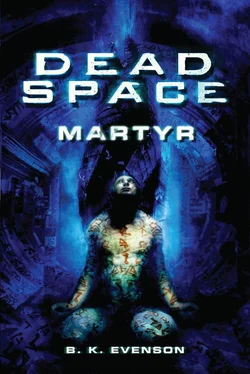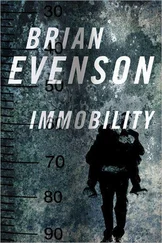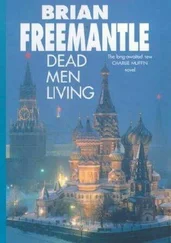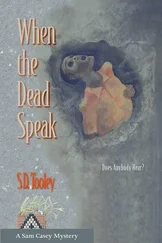“The folktales, they’re starting to change, and quickly, too. That doesn’t happen, Michael. It never happens.”
Altman was suddenly serious. “Never?”
“Never.”
“Shit.”
“They keep speaking of the devil’s tail,” she said, “a kind of twisted pronged thing. When they mention it, they cross their fingers, like this.” She raised her middle and index fingers, crossed them. “But when I try to get them to talk about it, they fall silent. They’ve never been like that with me before. It’s like they don’t trust me anymore.” She brushed the top of the table with her hand. “You want to know what’s strangest of all?”
“What?”
“Do you know how they say ‘tail of the devil’ in Yucatec Maya? Same name as the crater: Chicxulub.”
Altman felt his throat go dry. He looked at the clock. A quarter to eight. Still time to make it to the bar after all.
For a while, nobody spoke. They just stood there, watching the bruja, who, in her turn, steadying herself on Chava’s shoulder, just watched the creature.
“You see,” she said in a whisper that was nearly drowned out by the creature’s wheezing. “It is growing bigger.”
She reached deep into her pouch and pulled out a handful of something. She began to dance, tracing a slow circle around the creature, just at the edge of the cloud the creature was creating for itself. She dragged Chava along with her, sprinkling something in the sand before her. It was a wandering dance, off-kilter, almost drunken. At first the others just watched; then slowly one or two began to follow, then a few more. Some shook their heads, as if breaking out of a trance.
When she stood directly across from the creature’s head, she stopped and began turning in place. Soon everyone was doing this, watching the bruja, falling into place, slowly forming a complete circle. They turned around the creature, some of them standing knee deep in the surf.
She swung her staff before her, stepped back, and stepped forward again. The others followed. Chava stepped too far and found himself coughing, having breathed some of the gas the creature was emitting. His eyes stung; his throat itched.
The bruja lifted her hands, her index and middle fingers crossed. Chicxulub, she murmured, and turned again. The word went up mangled from the mouths of the others, like a groan.
The bruja slowly turned and walked away, her back straighter and her stride firmer than on the walk over. She walked a few yards back from the circle and dug into the sand until she unearthed a piece of driftwood, then turned and rejoined the circle again. She nodded and gestured at Chava until he, too, left the circle and came back with driftwood. One by one the others followed, wandering out of the circle and coming slowly back.
The skin that formed the gray sacs on the creature’s back had thinned and thinned as the sacs grew. Now it was almost transparent. The sacs slowly billowed up until they were taut and then deflated, going about halfway slack before swelling again. It was a terrible thing to watch. Chava kept expecting them to burst.
The bruja was dancing again. She lifted her chunk of driftwood high, gave a toothless smile, and threw it at the creature.
It struck the creature softly in the face and fell to the sand just below it. The creature didn’t react at all.
“Now you,” said the bruja to Chava. “Higher. And harder.”
He threw his piece of wood high and hard, at the leftmost sac. It struck the sac near the bottom and tore it just slightly. Air began to hiss out. The bruja raised her hands and brought them down and the others threw their pieces of wood as well. One or two missed, one or two bounced off, but more than a few tore the sacs, some quite deeply. Air rushed out of them; the acrid cloud slowly began to disperse.
“Now, go,” the bruja said to Chava, her voice hoarse. “You see the nameless man there, stumbling drunk as usual. Run to him and take his bottle and bring it back to me.”
He ran quickly around the circle and to the small but dignified dark-haired drunk who had gotten too close to the cloud earlier and almost died. The man turned and smiled at him. Before he could react, Chava grabbed the bottle he’d posted between his feet and fled back to the bruja .
She took it from him and uncorked it. Behind them the drunk was protesting, some of the others holding him back. “Hold your breath,” she said to Chava as she gave him the bottle. “You must pour this on the wood and on the creature itself.”
His heart pounding, Chava took a deep breath and rushed forward. The torn skin of the sacs had already begun to knit itself back together. The bags were still mostly deflated but were beginning to rise. He upended the bottle, splashing the creature and the wood around it, and then rushed back to the bruja, his eyes swollen and stinging.
The bruja lit the top of her staff on fire and carefully moved forward, touching it to the creature’s head.
Both the creature and the driftwood caught fire immediately. She dropped her staff, letting it burn, too. The creature hissed and thrashed, but never tried to escape from the flames. The gray sacs on its back turned to ash and blew away. Eventually it stopped moving altogether.
The bruja, swaying, led them once again in a slow, stuttering dance. Chava found his feet naturally following it, adapting to it, almost as if someone else were moving his legs. He wondered how many of his fellow villagers felt the same way. The village drunk, he saw, wasn’t part of the circle; he stayed at a little distance, swaying slightly, staring at the fire, his brow furrowed. They kept on, tracing slow curving motions in the air, until all that was left of the creature was a charred, smoldering skeleton. Stripped of its flesh and burnt to a crisp, it looked almost human.
He ordered a bottled beer and made sure it came with the cap still sealed. As he waited on his change, he scanned the bar, trying to determine who might have telephoned him. The small bar’s only inhabitants were half a dozen scientists from the North American sector — it could have been any one of them.
He sat down at a table. He’d just opened the beer and taken a sip when a man approached him. The man was pale skinned and thin, wearing a jumpsuit, his hair cropped short. Altman guessed he must be a technician of some sort.
“You’re Altman,” the man said. It wasn’t a question.
“That’s right,” said Altman. “And you are. ”
“I only give my name out to friends,” he said. “Are you a friend?”
Altman stared at him.
“All right,” said the man. “Maybe you don’t make friends right off the bat. Okay, whatever you think of what I tell you, if anybody asks, you didn’t hear it from me.”
Altman hesitated only a moment. “All right,” he said.
“Shake on it?” the man suggested.
The man extended a hand. Altman took it, shook. “Hammond,” the man said, “Charles Hammond.” He pulled out the table’s other chair and sat down.
“Nice to meet you,” said Altman. “Now suppose you tell me what’s going on.”
Hammond leaned in closer. “You’ve been noticing things,” he said. “You’re not the only one.”
“No?” said Altman coolly.
“I’m in communications. Freelance, mostly industrial installations.” He reached out and poked Altman’s chest lightly with a finger. “I’ve been noticing things, too.”
“Okay…”
“There’s a pulse,” Hammond said. “Slow and irregular, and very weak, but strong enough to fuzz up other signals just a little. I’m a perfectionist. When I set something up, I like it to be crystal clear. Things that don’t bother other people bother me. That’s why I noticed it.”
Читать дальше












